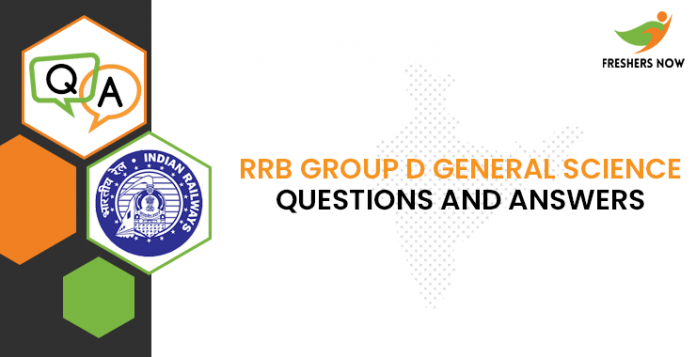
RRB Group D General Science Questions and Answers PDF Download: Are you preparing for RRB Group D 2021 Exam? If yes, check and prepare with the RRB Group D General Science Questions and Answers provided below. In RRB Group D Level 1 Exam, there will be only 25 Questions asked in the General Science section. For the sake of all candidates, we have provided the RRB Group D General Science Questions With Answers in detail. Also, you can prepare the mode RRB General Science Questions and Answers from each topic. Aspirants can also practice the RRB General Science Mock Test Q & A to score more marks in the test. Download the RRB Group D General Science Questions and Answers PDF through the link provided below.
RRB Group D General Science Questions and Answers
1) Brass gets discolored in the air because of the presence of which of the following gases in air?
A) Oxygen
B) Hydrogen sulphide
C) Carbon dioxide
D) Nitrogen
Answer: (B)
2) Which of the following metals forms an amalgam with other metals?
A) Tin
B) Mercury
C) Lead
D) Zinc
Answer: (B)
3) The gas usually filled in the electric bulb is
A) nitrogen
B) hydrogen
C) carbon dioxide
D) oxygen
Answer: (A)
4) Which of the gas is not known as green house gas?
A) Methane
B) Nitrous oxide
C) Carbon dioxide
D) Hydrogen
Answer: (D)
5) Bromine is a
A) black solid
B) red liquid
C) colourless gas
D) highly inflammable gas
Answer: (B)
6) Which animal never drinks water in its entire life?
A) Kangaroo
B) Hippopotamus
C) Rat
D) Kangaroo rat
Answer: (D)
7) _________________ is the longest cell.
A) Nerve Cell
B) Skin
C) Spleen
D) None of the above
Answer: (A)
8) What is the life span of RBC?
A) 130 days
B) 110 days
C) 100 days
D) 120 days
Answer: (D)
9) Which is the vertebrate that has two chambered heart?
A) Fish
B) Snake
C) Blue Whale
D) Crocodile
Answer: (A)
10) Which of the following was to be discovered first in the chromospheres of the sun?
A) Krypton
B) Xenon
C) Neon
D) Helium
Answer: (D)
11) Which of the following is used in pencils?
A) Graphite
B) Silicon
C) Charcoal
D) Phosphorous
Answer: (A)
12) Potassium nitrate is used in
A) medicine
B) fertiliser
C) salt
D) glass
Answer: (B)
13) Soda water contains
A) carbonic acid
B) sulphuric acid
C) carbon dioxide
D) nitrous acid
Answer: (C)
14) Production of chlorofluorocarbons (CFC) gas which is proposed to be banned in India, is used in which of the following domestic products?
A) Television
B) Refrigerator
C) Tube light
D) Cooking gas
Answer: (B)
15) Bell metal is an alloy of
A) nickel and copper
B) zinc and copper
C) brass and nickel
D) tin and copper
Answer: (D)
16) Potassium Permanganate is used for purifying drinking water, because
A) it is a sterilising agent
B) it dissolves the impurities of water
C) it is a reducing agent
D) it is an oxidising agent
Answer: (D)
17) Which is the largest human cell?
A) Liver
B) Skin
C) Spleen
D) Ovum
Answer: (D)
18) There are _____ number of muscles in human.
A) 638
B) 637
C) 639
D) 640
Answer: (C)
19) Which of the following is in liquid form at room temperature?
A) Lithium
B) Sodium
C) Francium
D) Cerium
Answer: (C)
20) Permanent hardness of water may be removed by the addition of
A) sodium carbonate
B) alum
C) potassium permanganate
D) lime
Answer: (A)
21) Chemical formula for water is
A) NaAlO2
B) H2O
C) Al2O3
D) CaSiO3
Answer: (B)
22) Brass gets discolored in the air because of the presence of which of the following gases in air?
A) Oxygen
B) Hydrogen sulphide
C) Carbon dioxide
D) Nitrogen
Answer: (B)
23) Which of the following metals forms an amalgam with other metals?
A) Tin
B) Mercury
C) Lead
D) Zinc
Answer: (B)
24) Sodium metal is kept under
A) petrol
B) alcohol
C) water
D) kerosene
Answer: (D)
25) Potassium nitrate is used in
A) medicine
B) fertilizer
C) salt
D) glass
Answer: (B)
Direct Link To Get RRB Group D General Science Questions and Answers PDF
| Important Link | |
|---|---|
| To Download RRB Group D General Science Questions and Answers PDF | Click Here |
RRB Group D General Science Questions and Answers – FAQ’s
How to download RRB Group D General Science Questions and Answers PDF?
Candidates can download the RRB Group D General Science Questions and Answers PDF through the direct link given on FreshersNow.Com.
How many General Science questions will be asked in the RRB Group D Exam?
A total of 25 Questions General Science questions will be asked in the RRB Group D Exam.
Is there any sectional time limit for the RRB Group D General Science Section?
There is no such sectional time limit for the General Science Section in the RRB Group D Exam.
What is the time limit allocated for the RRB Group D Exam?
The total time duration will be 90 minutes for general candidates and 120 minutes for the PWD candidates.



